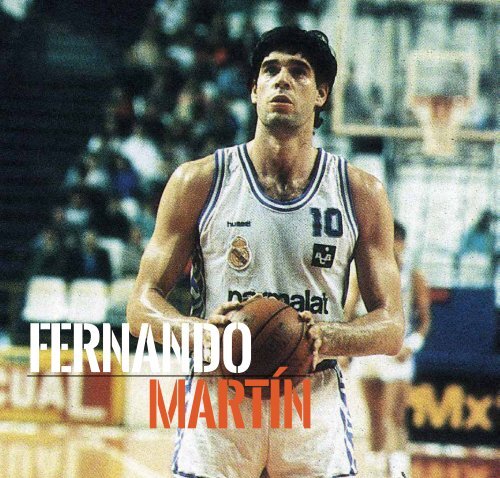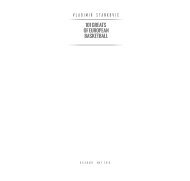FERNANDO MARTIN - 101 Greats of European Basketball
Create successful ePaper yourself
Turn your PDF publications into a flip-book with our unique Google optimized e-Paper software.
Fernando<br />
Martín<br />
191
A pioneer gone<br />
too soon<br />
Under the name <strong>of</strong> Fernando Martin,<br />
there are not many numbers in the<br />
NBA data storage. He played 24 games<br />
with the Portland jersey for a total<br />
146 minutes and had 22 points and<br />
28 rebounds. Looking only at those<br />
numbers, it’s difficult to call the man behind them a<br />
“pioneer in the NBA”, but the case <strong>of</strong> Fernando Martin<br />
is justified when we look at the year we are talking<br />
about: the 1986-87 season.<br />
Martin, who was born March 25, 1962, in Madrid and<br />
died December 3, 1989, was just the second <strong>European</strong><br />
player in the NBA. Nowadays, only the veteran connoisseurs<br />
<strong>of</strong> <strong>European</strong> basketball and the NBA know that<br />
the honor <strong>of</strong> being the first belongs to Georgi Glouchkov<br />
<strong>of</strong> Bulgaria. In the summer <strong>of</strong> 1985, Glouchkov<br />
signed a guaranteed contract with the Phoenix Suns for<br />
two years, thus making the history books.<br />
Fernando Martin was the next one but had double<br />
bad luck. First, a constant flurry <strong>of</strong> injuries prevented<br />
him from playing at his best and, second, he suffered<br />
from a total lack <strong>of</strong> trust for <strong>European</strong> players on the<br />
part <strong>of</strong> his coaches. That is something that many<br />
others like Vlade Divac, Alexander Volkov, Sarunas<br />
Marciulionis and Drazen Petrovic suffered later, too,<br />
even though they got more opportunities to show<br />
their skills.<br />
The signing <strong>of</strong> Martin by Portland changed the way<br />
the NBA was treated in Spain. Until then, newspapers<br />
published very little content about the league, television<br />
didn’t even air games and the best-known NBA<br />
players were nobodies in Spain. With Fernando Martin,<br />
everything changed.<br />
A star in Damascus in 1979<br />
I remember the name <strong>of</strong> Fernando Martin well because<br />
I heard it for the first time at the U16 <strong>European</strong><br />
Championship 1979, which took place in Damascus,<br />
Syria! The Middle East was then part <strong>of</strong> FIBA Europe.<br />
Luka Stancic, the Yugoslav head coach, led his team<br />
to victory in the final against Italy by the score <strong>of</strong><br />
103-100. However, Stancic talked to me about “some<br />
Fernando Martin,” the big man <strong>of</strong> the Spanish team<br />
which, coached by Aito Garcia Reneses, won the bronze<br />
medal. In the first game, which Yugoslavia won by only<br />
one point, 89-88, Martin scored 23 points and overwhelmed<br />
all the big men <strong>of</strong> the Yugoslav team. With<br />
a total 123 points (17.6 average), Martin was the best<br />
Spanish scorer and one <strong>of</strong> the outstanding players in<br />
the tourney that gave <strong>European</strong> basketball other greats<br />
such as Antonello Riva (Italy), Valeri Tikhonenko (USSR),<br />
Uwe Blab (Germany), Zoran Cutura (Yugoslavia) and<br />
Andres Jimenez (Spain).<br />
One year later, at the U18 <strong>European</strong> Championship<br />
in Celje, Slovenia, I could see the enormous potential<br />
<strong>of</strong> Martin with my own eyes. In the first game<br />
against Israel, he scored 37 points, against Belgium<br />
18, against France 11, against Czechoslovakia 34,<br />
against Bulgaria 25, against the USSR 33. He would<br />
put up 30 points against Bulgaria in the game for the<br />
bronze medal that Spain lost 96-90. He was a dominant<br />
center despite being just 2.05 meters tall. His<br />
broad shoulders, long hands and rebounding abilities<br />
made him play bigger than his height. His phys-<br />
<strong>101</strong> greats <strong>of</strong> european basketball<br />
Fernando Martín<br />
M
Vladimir Stankovic<br />
ical power went hand in hand with good technique,<br />
a solid mid-range shot and, most <strong>of</strong> all, his winning<br />
character. He was a natural-born fighter, a man who<br />
never surrendered and never acknowledged a loss<br />
before the final buzzer.<br />
Born and raised in Madrid, Martin started playing in<br />
the Estudiantes basketball school, which has produced<br />
so many other great players. He was one <strong>of</strong> those kids<br />
with a talent for just about any sport. He excelled at<br />
handball, table tennis and swimming. In 1980, he made<br />
his debut on the Estudiantes first team and starting in<br />
1981 he was a staple in the starting five. It was clear<br />
that Spanish basketball had its new jewel. Many clubs<br />
put their eyes on him. It is normally said that he had a<br />
pre-agreement with Joventut Badalona, but an <strong>of</strong>fer<br />
from Real Madrid together with the fact that he would<br />
be able to stay in Madrid made him sign for the Whites<br />
in the end.<br />
He made his debut with the Spanish national men’s<br />
team, coached by Antonio Diaz Miguel, on May 13,<br />
1981, in Bordeaux against France and scored his first<br />
2 points with the red jersey that he would wear a total<br />
<strong>of</strong> 86 times. After playing in the World Cup 1982<br />
in Colombia (13.1 points per game), Martin was also<br />
a very important man in the Spain team that won the<br />
silver medal at EuroBasket 1983 in France. I saw him live<br />
there once again, as I did at the Los Angeles Olympics in<br />
1984, where Spain won the silver again and where Martin<br />
averaged 16.6 points. That summer, in the qualifying<br />
tournament for the Olympics, played in France, Martin<br />
led his team with 23.6 points. As always, he played<br />
each and every game with maximum effort, fighting<br />
with much bigger men than him. He was a coach and<br />
a fan favorite. He was an example and a leader on the<br />
court. In the 1985 EuroBasket in Germany, Martin also<br />
had good numbers (16.6) as he did in the 1986 World<br />
Cup in Spain (15.3).<br />
With Drazen, against Drazen<br />
During his first stint with Real Madrid, Fernando<br />
Martin won four Spanish League titles, two Spanish<br />
King’s Cups and one Saporta Cup. The latter came in<br />
1984 in Ostend, Belgium against Dino Meneghin’s Simac<br />
Milano by the score <strong>of</strong> 82-81, with Martin posting<br />
12 points and 10 rebounds. On April 3, 1985, he played<br />
his only EuroLeague final against Cibona Zagreb, but<br />
Madrid lost 87-78. Drazen Petrovic was the executor in<br />
that game with 36 points, while Martin had 14.<br />
After a year in Portland, Martin went back to Real<br />
Madrid in 1987 and in the Korac Cup final, a two-game<br />
series, Real Madrid got some revenge against Cibona.<br />
In Madrid, the Whites won 102-89 and in Zagreb they<br />
lost 94-93 (47 points by Petrovic), but Martin did not<br />
play the games due to a serious injury that had him<br />
away from the courts for a long time. One <strong>of</strong> the few<br />
games he played that year was in Belgrade, against<br />
Crvena Zvezda, in February <strong>of</strong> 1988. Madrid won 89-82<br />
with 11 points from Martin.<br />
In the summer <strong>of</strong> 1988, Real Madrid signed Drazen<br />
Petrovic and the old rivals became teammates. In<br />
November <strong>of</strong> that year, Real Madrid won the Spanish<br />
King’s Cup. In the quarterfinals, it defeated Huesca<br />
easily 88-64 with Martin’s 17 points. In the semis,<br />
against Joventut, Real Madrid won by 26 points, 90-74,<br />
as Martin scored 11. In the title game, the victim was FC<br />
Barcelona by the score <strong>of</strong> 85-81. Martin scored another<br />
11 points and Petrovic led the way with 27.<br />
The highlight <strong>of</strong> that year was a win in the Saporta<br />
Cup final against Snaidero Caserta in Athens on March<br />
14, 1989. It was the same stage on which Martin lost<br />
192<br />
193
Nobody could imagine that was the last trophy Fernando<br />
Martin would lift.<br />
On December 3, 1989, Fernando Martin left his<br />
house to drive to a home game against CAI Zaragoza<br />
– a game which, by the way, he was not going to play in<br />
due to some back problems he had been dealing with<br />
for some time. On the M30 highway that circles Madrid,<br />
he lost control <strong>of</strong> his Lancia in the middle <strong>of</strong> the afternoon<br />
and he died in the accident. Martin was only 27<br />
years old and still had a long career ahead <strong>of</strong> him. The<br />
game was suspended, and his funeral drew the presence<br />
<strong>of</strong> many big names in Spanish sports, including<br />
his on-court rivals like Epi and Audie Norris. Real Madrid<br />
retired his jersey number 10 and in 2007 he was inducted<br />
into the FIBA Hall <strong>of</strong> Fame.<br />
The Martin name was present for a few more years<br />
in Spanish basketball through Antonio, Fernando’s little<br />
brother, who followed his footsteps in Estudiantes, Real<br />
Madrid and the Spanish national team. Also, Jan Martin<br />
played for a few years in Estudiantes, Real Madrid and<br />
Fuenlabrada. Jan, the son <strong>of</strong> Fernando and Petra Sonneborn,<br />
an Israeli model, also played in several clubs in<br />
his mother’s country.<br />
So, the Martin saga lives on – if not on the courts,<br />
then surely in the memories <strong>of</strong> all <strong>of</strong> us who were lucky<br />
enough to enjoy the game <strong>of</strong> Fernando Martin.<br />
Fernando Martín<br />
the <strong>European</strong> crown to Petrovic in 1985. It was an unforgettable<br />
game that Madrid won 117-113, with overtime<br />
included after the fourth quarter ended 102-102. In an<br />
<strong>of</strong>fensive festival, Petrovic shined with 62 points (8 <strong>of</strong><br />
16 threes in 45 minutes) while on the other side, Oscar<br />
Schmidt had 44 points in 44 minutes (6 <strong>of</strong> 11 threes).<br />
<strong>101</strong> greats <strong>of</strong> european basketball<br />
M

















